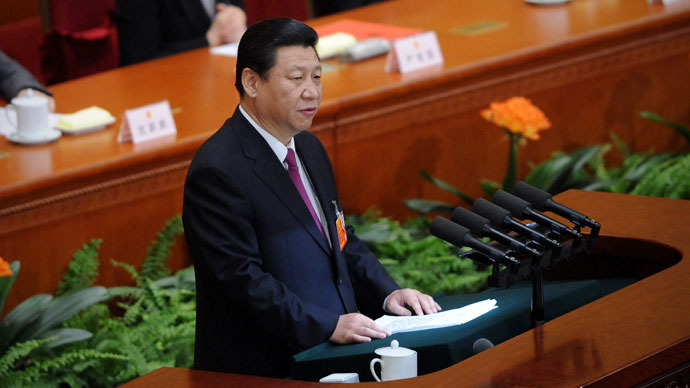Moscow-Beijing: Partnership of 'strategic universes'

President Xi Jinpin of China's visit to Moscow - the first oversees trip by the new Chinese leader which comes shortly after the historic “change of guard” at the National People's Congress in Beijing bears a lot of symbolism.
Trying to predict how China might revamp its development
strategy and upgrade her relationship with key players of both the
Western and non-Western world, political pundits can be likened to
Paul the Octopus – the UK-born oracle, comrade Ji himself was
referring to in his recent interview, while describing the
unpredictability of sport matches.
Big politics is not sport. However, despite a pre-planned summit
agendas it is as unpredictable as football matches in a World Cup.
You never know who will win and what will be the score. The new
Chinese game starts today, as under the reign of Xi Jinpin Beijing
would double its efforts to translate into reality the new “Chinese
renaissance” doctrine ( the revival of “Chinese greatness”) as its
was spelled out at the annual National People's Congress.
The key task of the new Chinese foreign policy is crystal clear: to fit US, Russia and other global powers into Beijing’s expanding “strategic universe”. This is what President Xi Jinpin’s “historic visit” to Moscow on his way to the BRICS summit in Durban, slated for March 26-27 is all about, as seen from a Chinese perspective.
Experts were quick to recall that it was not Russia’s President Vladimir Putin in Moscow, but US Treasury Secretary Jacob Lew, who was the first foreign dignitary to meet new President Xi Jinpin while on a visit to Beijing days before the Sino-Russian summit. However, the first US-Chinese high-level contact under President Xi by no means can be seen as a sign of a nearing reset or a honeymoon in US-Chinese relationship.

The world has seen ritual handshakes of President Xi and the former White House chief of staff, smiles with clenched teeth and polite statements, emphasizing the “great importance of China-US relations”. However, Jacob Lew’s visit to Beijing has rather underscored growing uneasiness if not frustration on both sides, dramatically sliding to a large-scale stand off in their struggle for global dominance. There is no way to deny that it is this bitter rivalry that would largely shape up the entire fabric of international relations in the years to come. A US-Chinese rift is too deep-seated and it has too many faces and dimensions: military stand off, economic rivalry, industrial espionage, “cyber wars”, fight for the control of vital resources, and finally, a different vision of the world and how it should be governed as well as conflicting civilization values. The prize is incredibly high -- the position of the world number one superpower which is currently held by the US, while claimed by rising ‘Red China”.
And here we come to what can be President Xi Jinpin’s stakes in
his policy towards Russia and why Beijing needs Moscow at this
“historic juncture”. While walking on a tightrope in its more
troubled and less predictable relations with the United States and
the West as a whole Beijing needs Russia as a neighboring and
unquestionably friendly Eurasian powerhouse, which proves to be not
only a balancing factor, but also “an important supporting
element in Beijing’s overall strategy of reclaiming China’s
“rightful place in the world”, as Dmitri Trenin, Head of Moscow
Carnegie Center puts it.
This is the reason why from the Chinese perspective the Russia
relationship distinctly stands out among links with the major world
powers and bears additional value. In recent years Beijing has
learned to use a former Soviet-era superpower as a source of raw
materials and energy for the resource hungry Chinese economy.
However, the name of the game is not only Chinese growing interest
in Russia’s resources and Chinese economic expansion to depopulated
and underdeveloped Russian Siberia and Far East regions.
What is less known is that in recent years China successfully
relied on Russia as a strategic cushion to strengthen its hand in
opposing Western led-liberal interventionism. It looks like
President Xi wants to give new steam to that policy, extensively
cooperating with Moscow on a bilateral level, as well as in a
number of international organizations, UNSC, Shanghai Cooperation
organization, Asia-Pacific Economic Cooperation, BRICS and G20
among them.
This is the primary reason why Moscow was a first point on the map of President Xi oversees trips to be followed by the Durban BRICS summit, where Presidents Putin and Xi will meet the leaders of India, Brazil and South Africa to discuss how to end the dominance of the US dollar as a global reserve currency and to restructure international financial institutions – the IMF and World Bank.
As great power relationships go, the reversal of China’s and
Russia’s fortunes at the start of the XXI century could not have
been more dramatic. The distant time of Opium wars of XIX century
which witnessed the period of China’s weakness and humiliation, has
gone into the history textbooks. Today, probably, for the first
time in their modern history, Russians have to deal with China
which is more powerful and more dynamic than their own country used
to be before the disintegration of the USSR.
However, it doesn’t mean that Moscow risks turning into a new
“Chinese colony”, as few anti-Chinese voices in Moscow predict. To
contemporary Russia China holds out a number of opportunities --
economic as well as political. China is a market for Russian raw
materials, it is a locomotive of economic development in the
Russian Far East and a fellow non-Western partner on the global
stage. The two countries share principal interests in such key
areas as global governance, nuclear non-proliferation, enhancing
regional and global security, etc.
So, today’s China fits Russia’s “strategic universe” the same way Russia does with the Chinese one.
The statements, views and opinions expressed in this column are solely those of the author and do not necessarily represent those of RT.
The statements, views and opinions expressed in this column are solely those of the author and do not necessarily represent those of RT.












